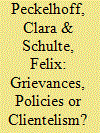|
|
|
Sort Order |
|
|
|
Items / Page
|
|
|
|
|
|
|
| Srl | Item |
| 1 |
ID:
191822


|
|
|
|
|
| Summary/Abstract |
In recent times, Nigeria and Ghana have experienced bloody conflicts between herders and farmers. Studies identify indigeneity and citizenship struggles as causal factors of the conflicts. Ghana and Nigeria have implemented policies and legislations to manage herders and farmers conflicts. Because scholarly engagement with the policies and legislations are relatively scant, the ways in which indigeneity and citizenship struggles are subtly ingrained in the provisions of the legislations and policies are yet to be unraveled. This study explores indigeneity and citizenship struggles in Ghana and Nigeria and how they foreground state policies and legislations for managing the conflicts.
|
|
|
|
|
|
|
|
|
|
|
|
|
|
|
|
| 2 |
ID:
191820


|
|
|
|
|
| Summary/Abstract |
In this paper, I attempt to build on and improve a significant conceptual innovation, made by Rogers Brubaker, between the terms ethnic category and ethnic group. This conceptual distinction problematizes groupist approaches and takes ethnic groupness as a variable to explore processes and dynamics of ethnic group formation. In this study, I improve and develop Brubaker’s conceptual distinction in two ways. First, I propose indicators for measuring ethnic category and ethnic group in the phenomenal world. Second, I develop a conceptual model based on the aforementioned conceptual distinction. I propose that ethnic identity can take four forms on the bases of how ethnic category members perform their ethnic identities in social and political domains: (1) socially and politically active ethnic identity, (2) socially active but politically dormant ethnic identity, (3) socially dormant but politically active ethnic identity, (4) socially and politically dormant ethnic identity. I suggest that these identity forms help us better understand the implications of the terms ethnic category and ethnic group at individual level by applying it to the Kurdish case in Turkey.
|
|
|
|
|
|
|
|
|
|
|
|
|
|
|
|
| 3 |
ID:
191818


|
|
|
|
|
| Summary/Abstract |
In this article, we explore the reasons why some ethnic groups tend to vote along ethnic lines while others do not. We argue that existing explanations for ethnic voting can be grouped into three main approaches: policy-based, grievance-based, and clientelism. However, we contend that inconsistencies in previous empirical research come from a failure to account for the political context in which ethnic voting occurs. Specifically, we argue that ethnic voting in democracies operates on a different logic than in non-democratic regimes. Our argument posits that policy- and grievance-based factors are the primary determinants of ethnic voting in democracies, whereas clientelist networks play a crucial role in understanding ethnic voting in autocratic regimes. To test our hypotheses, we use a sample of 428 ethnic groups from 33 African countries between 2005 and 2018, as well as a novel survey-based measurement of voting preferences among ethnic group members. Our findings support our hypotheses: in democratic regimes, grievance-based and policy-based explanations have strong explanatory power, whereas clientelism is the primary driver of ethnic bloc voting in autocracies. We conclude that both regime type and the different underlying mechanisms of clientelism require greater consideration in the research on ethnic voting.
|
|
|
|
|
|
|
|
|
|
|
|
|
|
|
|
| 4 |
ID:
191819


|
|
|
|
|
| Summary/Abstract |
By performing a manifesto content analysis, this article maps the discourse of secessionist parties on constitutional change cross-case (Belgium, Canada, Spain, and the UK) and over time (1990–2020). The results show that secessionist parties are pragmatic organizations that also advance devolutionist demands as a steppingstone toward full independence. Concerning framing, the results identify an increasing trend toward the articulation of a socioeconomic case for constitutional change. Political issues such as governance are also important. Instead, identity-based frames are much less prominent in their discourse. As strategic actors, secessionists take these decisions to enhance their position in the electoral market.
|
|
|
|
|
|
|
|
|
|
|
|
|
|
|
|
| 5 |
ID:
191821


|
|
|
|
|
| Summary/Abstract |
This article uses the case of the Covid-19 pandemic in Israel to examine whether there are differences in national identity between the vaccinated and the unvaccinated and how national identity is related to public views of the unvaccinated. A three-wave panel survey measuring national attachment, national chauvinism, and constructive patriotism from before and during the pandemic was used to trace differences in dimensions of national identity between the vaccinated and the unvaccinated and to explore their relationship to attitudes toward the unvaccinated. Findings indicated that national attachment was lower among the unvaccinated prior to the pandemic. However, regarding national chauvinism, there were no differences between the vaccinated and the unvaccinated over time; regarding constructive patriotism, there was a difference only in the third wave—at the end of the Covid-19 vaccination drive. The three dimensions of national identity were linked to negative attitudes toward the unvaccinated only at the end of the Covid-19 vaccination drive but not at the peak of the pandemic after the first lockdown. These findings are discussed in light of the current understanding of national identity during the pandemic.
|
|
|
|
|
|
|
|
|
|
|
|
|
|
|
|
|
|
|
|
|